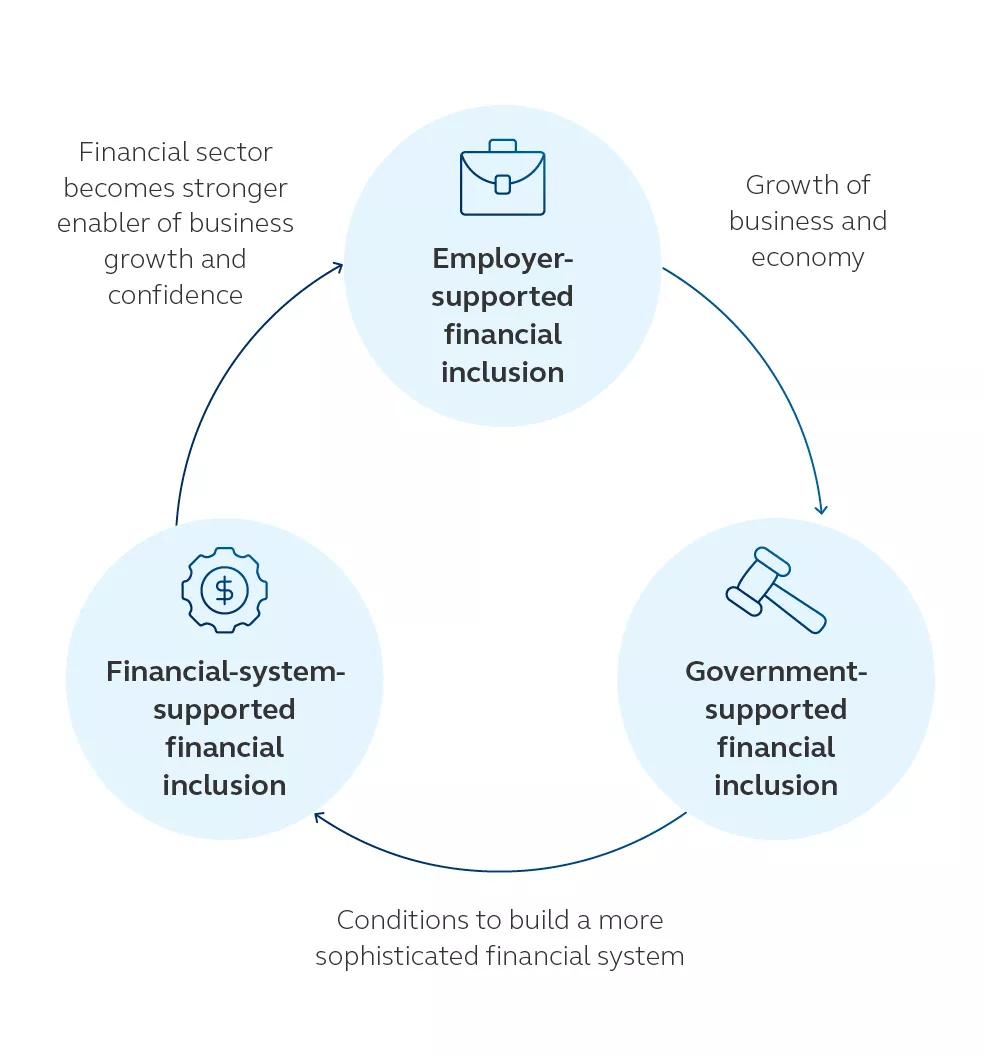Explore how markets in Southeast Asia are progressing through the phases of financial inclusion.

In the 2022 Global Financial Inclusion Index, we hypothesized that markets tend to move through three phases of financial inclusion. The phase a market is in typically corresponds to its economic maturity and the way it engages with institutions and citizens. We also suggested that an understanding of where markets sit within these three phases can offer clues about which economies may be set to experience an acceleration in their development as capital markets.
The trends we saw in the 2022 Index around the connection between financial inclusion and economic development continued in 2023—particularly in Southeast Asia. While this is a two-way relationship rather than one of causation, we believe that those markets progressing from one phase of financial inclusion to the next are primed to benefit from economic factors that can help accelerate their growth.
The 3 phases of financial inclusion
Markets tend to move through three phases of financial inclusion. Understanding a market’s evolution from one phase to another can offer insight into its economic development.
Phase 1: Employer-supported financial inclusion
The rule of law is established, and basic safety net programs are in place to support citizens’ most fundamental needs. Businesses have stepped in as the primary source of financial guidance and support for those employed. At this stage, many governments essentially lack the resources and infrastructure to provide comprehensive support at a state level.
Phase 2: Government-supported financial inclusion
The business environment in the market has matured and is fueling a stronger economy, giving the government greater firepower and resources to begin introducing measures to promote financial inclusion.
Phase 3: Financial-system-supported financial inclusion
Supportive employers and government have given way to a more developed financial system. This allows for greater participation and more points of access to meet the diverse needs of a population.

The three phases ultimately create a virtuous circle.
A well-evolved financial system helps become an enabler of business growth and confidence that allows businesses to support their workforces more generously and meaningfully, triggering a new cycle.
Financial inclusion in Malaysia and Vietnam shifts from being primarily employer supported to government supported.
For a market moving from employer-supported to government-supported financial inclusion, we would expect to see progress in the government pillar and potentially some progress in the financial system pillar while maintaining broadly stable employer support.
Malaysia
Overall
| 2023 | 2022 | YoY | |
|---|---|---|---|
| Score | 52.8 | 49.6 | +3.2 |
| Rank | 18 | 20 | +2 |
Government support
| 2023 | 2022 | YoY | |
|---|---|---|---|
| Score | 51.8 | 44.8 | +7.0 |
| Rank | 22 | 24 | +2 |
Financial system support
| 2023 | 2022 | YoY | |
|---|---|---|---|
| Score | 48.9 | 49.6 | -0.7 |
| Rank | 17 | 23 | +6 |
Financial system support
| 2023 | 2022 | YoY | |
|---|---|---|---|
| Score | 75.2 | 71.6 | +3.6 |
| Rank | 5 | 5 | — |
Vietnam
Overall
| 2023 | 2022 | YoY | |
|---|---|---|---|
| Score | 53.1 | 41.1 | +12.0 |
| Rank | 17 | 30 | +13 |
Government support
| 2023 | 2022 | YoY | |
|---|---|---|---|
| Score | 55.4 | 43.8 | +11.6 |
| Rank | 17 | 25 | +8 |
Financial system support
| 2023 | 2022 | YoY | |
|---|---|---|---|
| Score | 45.5 | 28.1 | +17.4 |
| Rank | 20 | 39 | +19 |
Employer support
| 2023 | 2022 | YoY | |
|---|---|---|---|
| Score | 77.2 | 87.4 | -10.2 |
| Rank | 4 | 1 | -3 |
Financial inclusion in Thailand shifts from being primarily government supported to financial system supported.
For a market slightly further along on this pathway, we would expect to see progress in the financial system pillar while maintaining broadly stable government and employer support. The data would also reflect improvements in indicators of business investment and growth—for example in areas such as enabling SME growth and success and general business confidence, alongside facilitating access to credit and access to capital.
Thailand’s performance in the Index reflects this trend, indicating it has reached a stage of development where economic growth, based on the right conditions at a government level, can be accelerated rapidly by the private financial sector.
Thailand
Overall
| 2023 | 2022 | YoY | |
|---|---|---|---|
| Score | 58.8 | 49.9 | +8.9 |
| Rank | 10 | 19 | +9 |
Government support
| 2023 | 2022 | YoY | |
|---|---|---|---|
| Score | 44.3 | 45.0 | -0.7 |
| Rank | 28 | 23 | -5 |
Financial system support
| 2023 | 2022 | YoY | |
|---|---|---|---|
| Score | 71.1 | 50.4 | +20.7 |
| Rank | 2 | 20 | +18 |
Employer support
| 2023 | 2022 | YoY | |
|---|---|---|---|
| Score | 68.5 | 70.2 | -1.7 |
| Rank | 10 | 6 | -4 |
Singapore and Hong Kong may be moving into a new cycle.
Singapore and Hong Kong may be moving into a new cycle in their own unique ways, where the actions of the government and the financial system help enable and empower employers to provide enhanced levels of support to their workforces to promote financial inclusion.
In markets where the government and financial system are very strong promoters of financial inclusion, employer support typically wanes. This is because in markets where government and financial support are lacking, the employer is often obligated to act as the main financial safety net and source of guidance. When a market’s government and financial system become mature enough to underpin a more financially inclusive society, employers no longer have to bear the primary responsibility.
Singapore and Hong Kong, the top ranked markets globally for financial inclusion, are clear exceptions to this trend so far. In addition to their financial system and government support rankings remaining stable or improving, both markets also made strides forward in employer support in the 2023 Index.
Where highly financially inclusive government and financial services systems encourage business growth and economic advancement through their policies, products, and actions, the nature of employer support changes. We see this as a shift from “employer obligated” to “employer enhanced” support: In the most financially inclusive systems, employers can more generously support their workforces.
Singapore
Overall
| 2023 | 2022 | YoY | |
|---|---|---|---|
| Score | 73.9 | 68.9 | +5.0 |
| Rank | 1 | 1 | — |
Government support
| 2023 | 2022 | YoY | |
|---|---|---|---|
| Score | 75.3 | 69.5 | +5.8 |
| Rank | 1 | 1 | — |
Financial system support
| 2023 | 2022 | YoY | |
|---|---|---|---|
| Score | 70.7 | 70.2 | +0.5 |
| Rank | 3 | 3 | — |
Employer support
| 2023 | 2022 | YoY | |
|---|---|---|---|
| Score | 81.8 | 60.2 | +21.6 |
| Rank | 2 | 14 | +12 |
Hong Kong
Overall
| 2023 | 2022 | YoY | |
|---|---|---|---|
| Score | 71.1 | 65.2 | +5.9 |
| Rank | 2 | 4 | +2 |
Government support
| 2023 | 2022 | YoY | |
|---|---|---|---|
| Score | 75.3 | 62.2 | +13.1 |
| Rank | 2 | 8 | +6 |
Financial system support
| 2023 | 2022 | YoY | |
|---|---|---|---|
| Score | 67.1 | 67.1 | — |
| Rank | 6 | 6 | — |
Employer support
| 2023 | 2022 | YoY | |
|---|---|---|---|
| Score | 70.0 | 69.8 | +0.2 |
| Rank | 7 | 8 | +1 |
What’s next?
Dig into the data and read the full report at the Global Financial Inclusion Index site.


